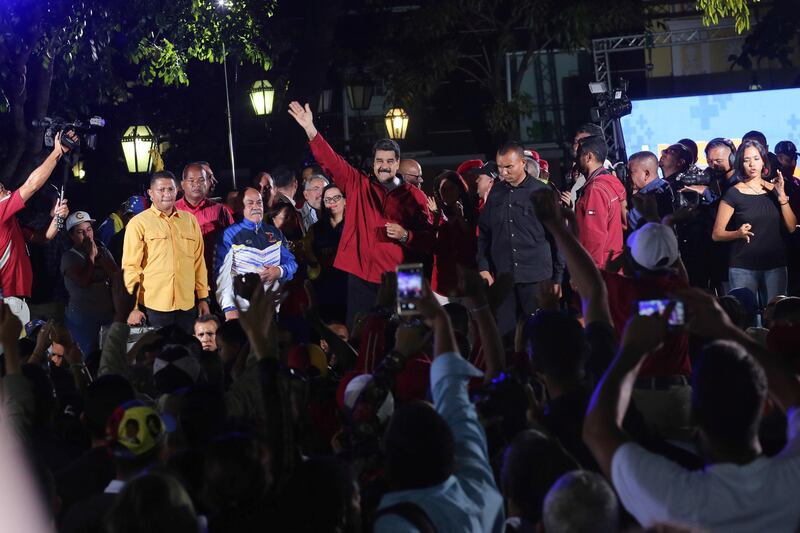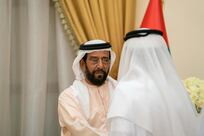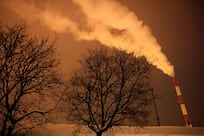Venezuela braced for fresh violence on Monday as president Nicolas Maduro said over 8 million people had participated in a vote a day before to elect a new assembly tasked with rewriting the nation’s constitution while opposition figures said turnout had in fact been far lower.
Mr Maduro moved swiftly to dismiss criticism, which also came from several foreign governments, including the United States. In a seemingly ebullient mood, he told Venezuelans after the vote that the new body, which will boast almost boundless powers, would come into being as planned — even as Washington was readying on Monday to impose fresh economic sanctions on the country.
"The people have delivered the constitutional assembly,” Mr Maduro declared on national television. "More than 8 million in the middle of threats … it's when imperialism challenges us that we prove ourselves worthy of the blood of the liberators that runs through the veins of men, women, children and young people."
A livid opposition insisted turnout had not exceeded 3 million, matching estimates offered by some independent analysts in what would be a feeble showing compared to past elections. It slammed Sunday's election as a desperate attempt by the socialist president to extinguish the last vestiges of democracy and hold on to power.
A healthy level of participation in the vote was crucial for Mr Maduro, who insists that only by creating the new assembly can he make progress towards ending the political and economic crisis gripping the country. Some, however, warn that Venezuela, once a vibrant regional power with the largest oil reserves in the world, is instead sliding inexorably towards dictatorship.
To be made up entirely of Maduro loyalists, the new body is due to gather for a first session later this week. Its first order of business may be to dissolve the National Assembly, which has already seen its powers sharply curtailed since it came under opposition control in January 2016. Mr Maduro also signalled that he expects the constitutional assembly to dismiss attorney general Luisa Ortega, a former stalwart of the government who has recently taken openly to challenging it.
The election came after several months of growing anti-government street protests in Caracas and elsewhere. Violent clashes between demonstrators and military police have already cost about 120 lives while initial reports said as many as 10 more people were killed on Sunday alone. The opposition called on Monday for fresh mass protests in the wake of the vote.
While predictions of civil war in Venezuela may be overstated — as of now the powerful military continues to stick by the president — the protests could reach a dangerous climax this week, especially if the new assembly meets in the coming days as promised by Mr Maduro.
But the stand-off seems almost intractable, in part because between the regime on the one hand and the opposition movement on the other, there is no viable middle-ground political force. It may take intervention from interested parties outside Venezuela to cajole the two sides into meaningful dialogue to defuse the crisis. Possible players could include Cuba or the Vatican.
The US may have ruled itself out as potential broker, after condemning the poll and threatening fresh sanctions. In a statement late on Sunday, the state department vowed “strong and swift actions against the architects of authoritarianism in Venezuela”. The US may, however, be playing into Mr Maduro’s hands as he tries to retain popular support.
“A spokesperson for emperor Donald Trump said that they would not recognise the results of Venezuela's constituent assembly election," the Venezuelan president raged to supporters after the polls closed. "Why the hell should we care what Trump says? We care about what the sovereign people of Venezuela say."
Jack Pannell, a research associate at the Council on Hemispheric Affairs in Washington DC, warned against taking too aggressive a stand.
“Any peaceful solution to the ongoing situation needs active dialogue between the two sides, something that is hindered by external efforts to threaten Venezuela and delegitimize the vote in totality,” he said.
Other regional powers, however, lined up to say they would not recognise the vote, including Argentina, Peru, Colombia, Paraguay and Panama. Britain and Canada said likewise and in Brussels, a spokeswoman for the European Commission said the assembly "elected under doubtful and often violent circumstances cannot be part of the solution”.
The turmoil comes amid ever worsening hardship for ordinary Venezuelans as the country’s economy continues to spiral to virtual collapse. Severe shortages of basic necessities, including foods and medicines, have fed popular anger at the Maduro government, even among those who count themselves "Chavistas", eager supporters of the socialist form of government introduced by former president Hugo Chavez when he came to power in 1998 and continued by Mr Maduro.
If the 8 million number offered by Mr Maduro and the National Electoral Council is indeed a fable, it may be hard to sustain. A report issued by Torino Capital, a New York investment bank, and a Venezuela public opinion company estimated that in reality only about 3.6 million people had voted. Many of those were government workers who may have felt threatened with retribution if they didn’t show up at polling stations.






